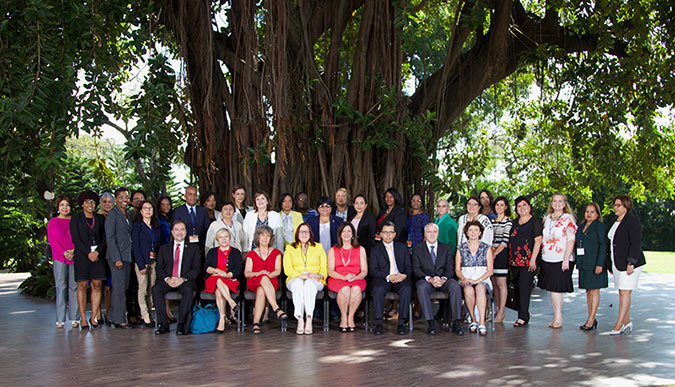Declaration of Santo Domingo
Ministers and the highest gender authorities from 29 countries in Latin America and the Caribbean signed the Regional Declaration of Santo Domingo prior to the 62nd session of the Commission on the Status of Women (CSW62)Date:

The Declaration of Santo Domingo, which reflects the position of Latin America and the Caribbean ahead of the 62nd session of the Commission on the Status of Women (CSW62), was adopted Wednesday (7 February) by Women's Ministers and top gender authorities from 29 countries in the region.
The priority theme of the Declaration is aligned with that of the next session of CSW, "Challenges and Opportunities in Achieving Gender Equality and the Empowerment of Rural Women and Girls," which will be held in New York City on March 12 to 23, 2018.
he Declaration reaffirms previous commitments of States in conventions, covenants and international and regional agreements on women's human rights, gender equality, sustainable development, in favor of the physical autonomy, decision-making and the economic empowerment of all women and rural girls in all their diversity.
Authorities that met in Santo Domingo endorsed these commitments with a main focus on women and girls from rural Latin American and Caribbean communities through four pillars: Right to an adequate standard of living, guaranteeing income security and social protection; Right to food, food security and nutrition; Right to land and productive resources; improve the production of statistics and indicators.
In Latin America and the Caribbean there are 58 million rural women, a diverse group in terms of their identity, ways of life, social organization and activities they develop, and have been participants in the development of the region. However, they have remained excluded as subjects of political and social rights, consequence of a colonial system, of highly centralist and patriarchal societies.
In 2015, all the countries of the region committed to reducing poverty and inequality without leaving anyone behind by signing the 2030 Agenda for Sustainable Development, which includes 17 sustainable development goals and their corresponding goals, in which it is linked the empowerment of rural women and girls to their achievement.
Regarding international treaties, the Convention on the Elimination of All Forms of Discrimination Against Women (CEDAW) remains the only one that includes a specific article to the status of rural women (Article 14), exhorting Member States to adopt all the necessary measures so that their rights of access to basic services and productive resources are respected and reinforced, as well as to participate in rural development at all levels. For the first time, their right to receive equal treatment in agrarian reform plans was included.
To this Declaration, we add the work and presence of women's leadership in the defense of territories and natural assets, as well as organizations and networks of rural, indigenous and peasant women of the region in the global forums that, with the support of multilateral organizations, has made it possible to place in the public debate issues such as the feminization of agriculture or the important role played by rural women in food security and building resilience in the face of climate change and its consequences such as drought, floods and deforestation.
In conclusion
Ministers and national authorities requested that the Santo Domingo Declaration be submitted to Ministries of Foreign Affairs and Permanent Missions to the UN to inform the discussions ahead of and during CSW62.
Rural women face structural barriers, discriminatory social norms and gender-insensitive policies that have limited their power in political participation and within their communities and households. Their work, which has been increasing, is invisible and unpaid, and they cannot develop their full potential due to discrimination in access to productive goods and services, including land. However, this inequality is not inevitable. On the contrary, it is the result of political decisions and rooted patriarchal practices and beliefs.
A necessary first step for change is to recognize rural women as full and active citizens. This must lead the States to adopt all the necessary measures to guarantee their rights and so that they can be incorporated in equal conditions to the development processes.
The discussions that will take place within the framework of the 62nd session of the CSW are a unique opportunity to show commitment and keep moving forward firmly towards a road of empowerment for rural women and girls.
Find the downloadable version of the Declaration in here.